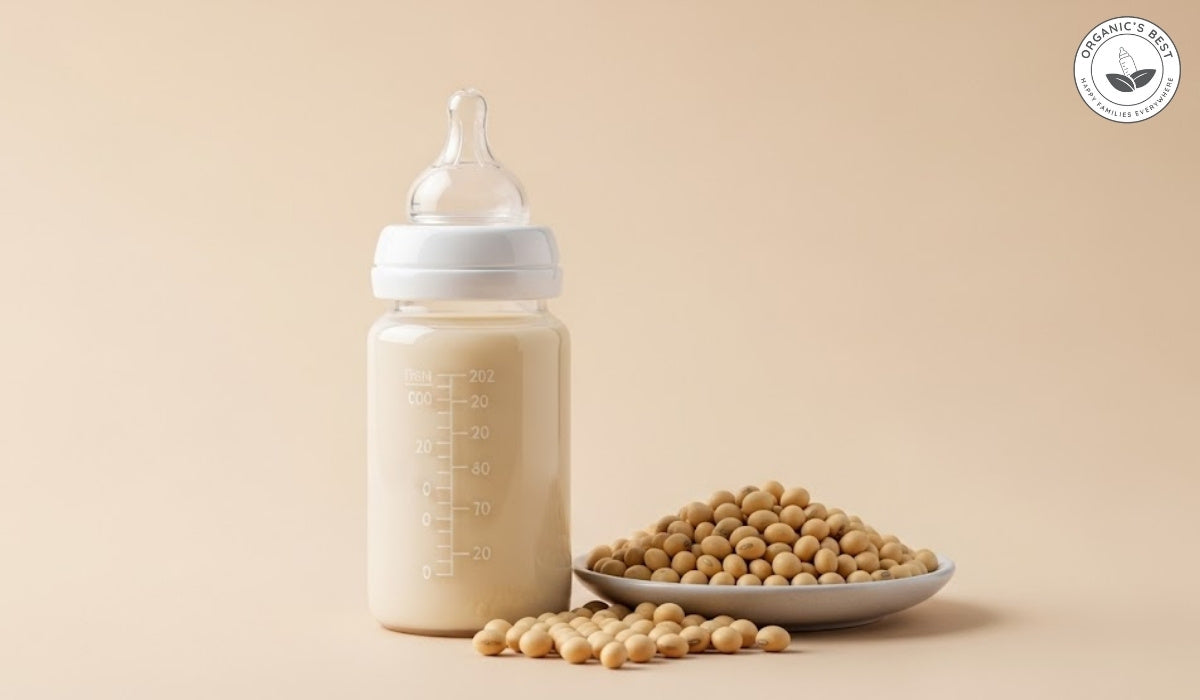Click to Get 2 FREE Boxes/Cans
Click to Get 2 FREE Boxes/Cans
Only New Customers! Click HERE to Get 2 Extra Boxes/Cans for Free With Your First Order.
Only New Customers! Click HERE to Get 2 Extra Boxes/Cans for Free With Your First Order.
BABY FORMULA
Offering new parents top-quality European infant formula from renowned brands like HiPP, Holle, Kendamil, and more. If you’re uncertain about which product to choose, our Formula Finder can help you make the best decision for your baby.
Baby Food
Offering new parents a premium selection of European baby foods, including jars, pouches, cereals, and snacks from esteemed brands like HiPP and Holle.
Revealing the Truth About Soy Formula
by Agustina Fernandez January 01, 2024 6 min read

For the many parents out there with little ones who aren't exclusively fed breast milk, formula becomes an important alternative. When turning to formula feeding, the typical choice is cow's milk-based formula, but for little ones with special dietary requirements, cow's milk may not cut it.
So, if your little bundle of joy requires special milk, one popular choice that often comes up is soy formula – a plant-based option. But as a parent, you might wonder: Is soy formula the right pick for your little one? The debate over the safety and effectiveness of soy milk has left many parents uncertain about what to choose. That's where we come in!
This comprehensive guide was made to give you a straightforward look at soy formula and other plant-based baby formula alternatives. We aim to help you understand the facts and make informed choices that match your child's needs.
Table of contents
- Understanding Soy Protein in Baby Formula
- The Debate Surrounding Soy Formula
- Potential Risks of Soy Formula
- The Advantages of Soy-Based Formulas
- Unveiling Bebe M Rice-Based Formula: A Plant-Based Alternative to Soy-Based Formula
- Choosing the Right Formula: Important Factors to Consider
Understanding Soy Protein in Baby Formula
Soy-based infant formula is a specially crafted infant feeding option that uses soy protein and is free from lactose. It's designed to be an alternative to both breastfeeding and traditional cow's milk formula. This choice becomes particularly relevant when infants face challenges digesting lactose, are allergic to cow's milk-based formula, or when families opt for a plant-based diet.
Reasons Why Parents Might Consider Soy Formula
There are two main reasons why parents might consider soy formula:
1) Soy formulas can be a solution for babies who display sensitivity or allergies to dairy-based products, providing a gentler option for their delicate digestive systems.
2) Families adhering to vegan diets find soy formula aligns with their plant-based choices. Breast milk is the ideal choice. However, before opting for a vegan diet for your baby, it's crucial to seek advice from a pediatrician, as this decision comes with intricate considerations.
The Debate Surrounding Soy Formula

Is soy formula safe? The safety and health implications of using soy milk in formula have sparked an ongoing debate among experts and parents alike.
Some concerns arise from the presence of compounds called phytoestrogens in soy milk, specifically soy isoflavones. These compounds have similarities to human estrogen and have raised questions about their potential effects on infant development.
Perspectives on soy formula being considered safe on this topic vary widely. While some studies suggest that these compounds could affect hormone levels and certain developmental aspects, others argue that the levels present in soy formula are too low to cause significant harm.
On one side, proponents of soy formula emphasize its benefits as a lactose-free, vegan alternative for infants with dairy sensitivities or allergies. They point to research indicating that infants fed soy formula can adequately grow and develop.
On the other hand, critics raise concerns about the long-term effects of phytoestrogens on sexual development, especially in early life stages when hormonal systems are still developing.
Learn More: Vegan Baby Formula: Good or Bad?
Potential Risks of Soy Formula
While soy infant formula offers an alternative to traditional cow's milk-based formulas, it's important to consider the potential health risks associated with its use. The primary areas of concern are hormonal effects, thyroid function, and allergies.

Hormonal Effects
Soy isoflavones, due to their structural resemblance to estrogen, can interact with estrogen receptors in the body. This has prompted worries about possible hormonal effects in infants, particularly given their developing endocrine systems.
A recent study revealed that newborns fed soy formula exhibited subtle differences in certain reproductive-system cells and tissues compared to those on either cow's milk formula or breastfeeding.
While not a cause for immediate concern, these findings emphasize the necessity of deeper exploration into the long-term impact of estrogen-like compounds present in soy-based baby formulas alone.
Thyroid Function
Some scientific evidence also suggests that excessive consumption of soy isoflavones might disrupt thyroid function, especially in individuals with preexisting thyroid conditions. However, the influence on healthy infants consuming soy-based formula remains a matter of scientific discussion.
Allergic Reactions
Food allergies are another area of concern. Although soy-based formulas are often recommended for infants with a cow's milk allergy, it's important to recognize that soy itself can also trigger allergic reactions in some individuals.
Cross-reactivity between cow's milk and soy proteins might lead to allergic responses, potentially causing discomfort and health complications in sensitive infants. That being said, soy protein allergies in children are relatively uncommon and are usually outgrown by age 10.
Despite these concerns, The American Academy of Pediatrics (AAP) maintains that soy-based formulas are a suitable option for infants with cow's milk allergies or lactose intolerance. AAP advises vigilant monitoring of exclusively soy-based formula-fed infants to ensure proper growth and development.
Learn More: How to Prevent the Development of Food Allergies in Babies
The Advantages of Soy-Based Formulas
While concerns about soybeans' high isoflavone content have been raised, especially regarding their effects on young individuals, research suggests that soy consumption doesn't negatively impact children's hormones or puberty; instead, it might notably reduce breast cancer risk and provide other health benefits.
Additionally, in certain medical conditions, soy formula becomes a necessary choice. Infants diagnosed with galactosemia, a rare genetic disorder preventing the breakdown of galactose (a sugar in milk), require a lactose-free diet.
In such cases, soy formula offers a viable alternative to cow's milk formula that meets their nutritional needs. Similarly, for babies with lactose intolerance, which hampers their ability to digest lactose, soy formula provides a suitable source of nourishment without causing digestive distress.
Unveiling Bebe M Rice-Based Formula: A Plant-Based Alternative to Soy-Based Formula
Introducing Bebe M rice-based formula, a promising dairy free formula alternative to traditional cow's milk and soy formulas. This innovative choice garners attention for its potential advantages and nutritional composition, catering to parents seeking alternatives to soy-based products.
Here Are Some of the Many Reasons to Love Bebe M Baby Formula:

-
Low in Allergens: Bebe M's organic infant formula is allergen-friendly, using rice protein for better bioavailability, excluding milk, soy, palm oil, and gluten.
-
Strictly Controlled: Bebe M ensures high quality by meticulously following European infant formula regulations and preserving nutrients through controlled production temperatures.
-
Anti-Reflux Aid: Carob gum, a natural thickener in Bebe M formula, prevents reflux in infants while promoting regular bowel movements due to its fiber content.
-
Sustainability: Beyond babies' health, Bebe M is committed to addressing environmental concerns, making it an ethical choice.
Choosing the Right Formula: Important Factors to Consider
Several crucial factors should be considered when selecting the ideal formula for your baby.
1) Firstly, it's vital to consider your baby's individual nutritional needs. Whether your little one has allergies, sensitivities, or specific dietary preferences, ensuring that the chosen formula aligns with these requirements is paramount.
2) Secondly, closely scrutinize the ingredients listed on the baby formula packaging. Look for allergens or components that might not fit your baby's digestive system.
3) Thirdly, and perhaps most importantly, seek guidance from healthcare professionals. Pediatricians possess the expertise to provide personalized advice based on your baby's unique health profile and dietary needs.
Lastly, we recommend trying out our Formula Finder Quiz to make this decision-making process smoother. This user-friendly tool has been designed to offer valuable guidance in selecting the formula that best suits your baby's specific and individualized needs.
To learn more, also check Soy VS Hypoallergenic Formula
Conclusion
While research on the benefits and drawbacks of soy formula is ongoing, parents and caregivers must make informed decisions about infant feeding based on a thorough understanding of the potential risks and benefits. Consulting with healthcare professionals can provide valuable insights tailored to individual circumstances and help ensure the best possible start for your child's development.
Disclaimer:
Please be aware that this information is based on general trends in babies, and it is not medical advice. Your doctor should be your first source of information and advice when considering any changes to your child’s formula and when choosing your child’s formula. Always consult your pediatrician before making any decisions about your child’s diet or if you notice any changes in your child. Breastfeeding is the best nutrition for your baby because breast milk provides your child with all the essential nutrients they need for growth and development. Please consult your pediatrician if your child requires supplemental feeding. |
Agustina Fernandez
Dr. Agustina Fernandez earned her medical degree from the prestigious Universidad Nacional de Córdoba, Argentina. With a deep-rooted passion for pediatrics, Dr. Fernandez is currently on the path to specializing in children's healthcare. Recently, she has delved into the vital field of infant nutrition. Her research interests include breastfeeding, infant formula, and baby food in little ones’ formative years. Dr. Fernandez's commitment to this area of study underscores her dedication to ensuring the health and well-being of children from their earliest days.
Leave a comment
Comments will be approved before showing up.
Also in Organic Infant Nutrition and Health Blog

10 Winter Activities for Kids and Toddlers
by Agustina Fernandez January 06, 2026 8 min read
Read More
How to Choose The Best Infant Formula: A Guide to EU Organic Formulas
by Agustina Fernandez January 05, 2026 14 min read
Read More
Best Formula for Breastfed Babies 2026 Guide
by Agustina Fernandez January 05, 2026 15 min read
Read More
Reviewed by Dr. Po-Chang Hsu, MD, MS
-

Dr. Po-Chang Hsu: Medical Reviewer of Organic's Best Blog
Dr. Hsu received his medical degree from Tufts University in Boston, Massachusetts, and holds a Master’s of Science degree from both Harvard University and Tufts University.
